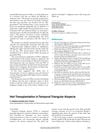 July 2018 in “Elsevier eBooks”
July 2018 in “Elsevier eBooks” Acne keloidalis nuchae is a chronic skin condition more common in African men, causing itchy or painful bumps and can lead to permanent hair loss if not treated early.
 January 2018 in “Elsevier eBooks”
January 2018 in “Elsevier eBooks” The document concludes that alopecia has various forms, each with specific treatments, but no definitive cure for certain types like CCCA has been proven.
 May 2017 in “InTech eBooks”
May 2017 in “InTech eBooks” Some hair loss disorders cause permanent loss due to scarring, and treatments like steroids don't always work well.
[object Object]  May 2017 in “InTech eBooks”
May 2017 in “InTech eBooks” Hair pulling disorder is treated with therapy and medication; hair loss from tension can be reversed if caught early.
 November 2012 in “South African Family Practice”
November 2012 in “South African Family Practice” The article concludes that early treatment of alopecia is crucial to prevent permanent hair loss.
 April 2012 in “Informa Healthcare eBooks”
April 2012 in “Informa Healthcare eBooks” Lichen planopilaris is a rare, chronic condition causing hair loss, mainly in middle-aged women, and early treatment is important to prevent permanent baldness.
 January 2012 in “Postgraduate obstetrics & gynecology”
January 2012 in “Postgraduate obstetrics & gynecology” Up to half of women by age 50 experience significant hair loss, with various types and treatments available.
 January 2010 in “Elsevier eBooks”
January 2010 in “Elsevier eBooks” The document concludes that different types of hair loss have specific treatments, and early diagnosis is crucial for preventing permanent hair loss.
 November 2009 in “Actas dermo-sifiliográficas/Actas dermo-sifiliográficas”
November 2009 in “Actas dermo-sifiliográficas/Actas dermo-sifiliográficas” Hair transplantation effectively treated a bald patch in an 18-year-old woman with Temporal Triangular Alopecia.
 August 1994 in “Drugs & Therapy Perspectives”
August 1994 in “Drugs & Therapy Perspectives” Psoriasis treatments range from topical creams to systemic medications with serious side effects, and while treatments can manage symptoms, there is no cure.
 January 1993 in “Side effects of drugs annual”
January 1993 in “Side effects of drugs annual” Natural products like propolis are causing more skin allergies, and certain skin treatments and medications have various side effects and risks.
 4 citations,
July 2020 in “Journal of Dermatological Treatment”
4 citations,
July 2020 in “Journal of Dermatological Treatment” Minoxidil injections can speed up hair regrowth in non-severe patchy hair loss, but combining it with steroids doesn't improve results.
 June 2018 in “Disease-a-Month”
June 2018 in “Disease-a-Month” Remove inflamed cysts surgically, avoid topical antibiotics on wounds, treat skin and mouth conditions with specific medications, and address underlying causes of hair loss.
 11 citations,
November 2019 in “Clinical Case Reports”
11 citations,
November 2019 in “Clinical Case Reports” A Brazilian teenager with severe hair loss had total hair regrowth with no side effects after using tofacitinib.
 October 2016 in “Elsevier eBooks”
October 2016 in “Elsevier eBooks” Common noncancerous skin diseases have various treatments, including topical applications, light therapy, surgery, and medications, with psychological support being important.
 February 2024 in “Lasers in Medical Science”
February 2024 in “Lasers in Medical Science” Lasers and energy-assisted methods show promise for treating hair loss, but more research is needed.
 19 citations,
May 2021 in “Clinical, Cosmetic and Investigational Dermatology”
19 citations,
May 2021 in “Clinical, Cosmetic and Investigational Dermatology” Minoxidil and finasteride are the best for non-scarring hair loss; more research is needed for scarring hair loss treatments.
2 citations,
January 2019 in “Skin appendage disorders” Early diagnosis and quick treatment improve life quality for FFA patients.
 1 citations,
August 2022 in “JAAD case reports”
1 citations,
August 2022 in “JAAD case reports” Pioglitazone use was linked to hair regrowth in a patient with permanent hair loss from cicatricial alopecia.
November 2022 in “Frontiers in Medicine” PRP shows promise for treating mild alopecia areata but needs more research for cicatricial alopecias.
 48 citations,
May 2013 in “Canadian Medical Association Journal”
48 citations,
May 2013 in “Canadian Medical Association Journal” Primary cicatricial alopecia, a rare disorder causing permanent hair loss, is hard to diagnose and treat, with treatments like anti-inflammatory drugs and steroids offering varied results and no guaranteed cure. Psychological support for patients is important, and future research should aim to identify causes of the condition.
9 citations,
May 2016 in “Clinics in dermatology” Phototherapy can help treat hair loss in alopecia areata.
 5 citations,
August 2019 in “International Journal of Women's Dermatology”
5 citations,
August 2019 in “International Journal of Women's Dermatology” The document concludes that it's important to recognize and treat hair loss in women of color, considering their unique hair characteristics and psychological impact.
 1 citations,
July 2023 in “Journal of Clinical Medicine”
1 citations,
July 2023 in “Journal of Clinical Medicine” Different causes of beard hair loss have various treatments, including medications, lifestyle changes, and procedures to stimulate hair growth.
 May 2024 in “Dermatologic therapy”
May 2024 in “Dermatologic therapy” AKN is a chronic scalp condition in African-descended males, treated with topicals, antibiotics, steroids, and sometimes surgery or laser.
 February 2024 in “Journal of cutaneous and aesthetic surgery”
February 2024 in “Journal of cutaneous and aesthetic surgery” The combined treatment helps improve severe hair loss and reduces the need for other medications.
 August 2023 in “Dermatology and Therapy”
August 2023 in “Dermatology and Therapy” Experts recommend personalized treatment plans for best outcomes in managing Alopecia Areata.
 April 2023 in “Revista colombiana de reumatología”
April 2023 in “Revista colombiana de reumatología” JAK inhibitors like tofacitinib can effectively treat severe alopecia areata.
[object Object]  March 2022 in “Wound practice & research”
March 2022 in “Wound practice & research” New treatments for alopecia areata show promise, but standardized guidelines are needed.
56 citations,
October 2016 in “Journal of dermatological science” New insights into the causes and treatments for the autoimmune hair loss condition Alopecia areata have been made.


























